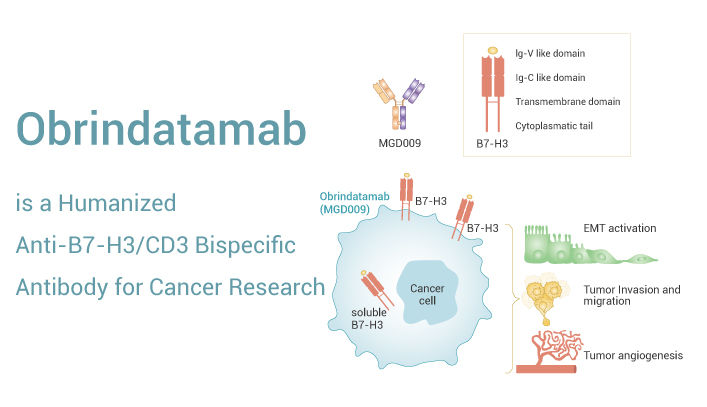B7-H3 (CD276) is a T cell co-stimulator and co-suppressor molecule. Specifically, B7-H3 plays an important role in tumor cell apoptosis, proliferation, adhesion, angiogenesis, invasion, migration, and escape from immune surveillance. Effects of B7-H3 on T cell proliferation, activation, and IFN in vitro-γ show a positive regulatory function during production. Besides, B7-H3 is also relevant to tumor progression through non-immune responses. Moreover, B7-H3 is relevant to tumor immune escape and affects immune response and tumor behavior through different signaling pathways. The reduction of B7-H3 reduces the proliferation of colorectal cancer (CRC) cell lines. Overexpression of B7-H3 promotes glucose intake and lactic acid production, leading to abnormal glycolysis.
Furthermore, B7-H3 is an immune checkpoint transmembrane protein that is dysfunctional in many cancers. Meanwhile, B7-H3 expression is abnormally upregulated in many different cancer types. There is a correlation between B7-H3 expression and poor prognosis. Nonetheless, silencing B7-H3 reduces the malignant potential of cancer cells. Antibodies, CAR therapies, and synthetic inhibitors are being used to target B7-H3. The role of B7-H3 in tumor progression makes it a potential candidate for targeted therapy. Now, we will introduce a humanized anti-B7-H3/CD3 bispecific antibody, Obrindatamab.
Obrindatamab is a Humanized Anti-B7-H3/CD3 Bispecific Antibody for Cancer Research.

Above all, Obrindatamab (MGD009) binds to B7-H3 and CD3, thereby mediating redirected cytotoxic T-lymphocyte (CTL) activity against B7-H3-expressing cancer cells. Particularly, Obrindatamab has the potential for cancer research.
Next in importance, Obrindatamab binds human and cynomolgus monkey CD3 and B7-H3 with KDs of 13.9, 14.7, 24.6, and 30.2 nM for human CD3ε/δ, cynomolgus CD3ε/δ, human B7-H3-His, and cynomolgus B7-H3-His, respectively. Obviously, Obrindatamab mediates redirected killing of multiple B7-H3-expressing tumor lines. However, Obrindatamab-mediated T-cell activation and proliferation is target antigen-dependent.
Once again, Obrindatamab inhibits growth and tumor regression of B7-H3-expressing tumor xenografts in human T cell or PBMC-reconstituted mice.
All in all, Obrindatamab (MGD009) is a humanized anti-B7-H3/CD3 bispecific antibody.
References: